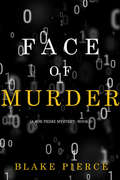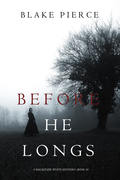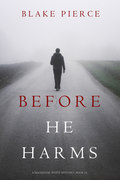
Блейк Пирс
Before He Sins
CHAPTER THREE
Mackenzie learned a great deal about Reverend Ned Tuttle in the next half an hour. For starters, he had left behind two sons and a sister. His wife had walked out on him eight years ago, moving to Austin, Texas, with a man she had been having an affair with for over a year before it had come to light. Both sons lived in the Georgetown area, leading Mackenzie and Ellington to their first stop of the day. It was just after 6:30 when Mackenzie parked her car along the curb outside of Brian Tuttle’s apartment. According to the agent who had broken the news, both brothers were there, waiting to do what they could to answer questions about their father’s death.
When Mackenzie stepped into Brian Tuttle’s apartment, she was a little surprised. She had expected to see two sons deep in grief, torn apart by the loss of their devout father. Instead, she saw them sitting at a small dining room table in the kitchen. They were both drinking coffee. Brian Tuttle, twenty-two years of age, was eating a bowl of cereal while Eddie Tuttle, nineteen, was absently dabbing an Eggo waffle into a pool of syrup.
“I don’t exactly know what you’re thinking we can offer you,” Brian said. “We weren’t exactly on the best terms with Dad.”
“Can I ask why?” Mackenzie asked.
“Because we stopped associating with him when he went full-tilt into the church.”
“Are you not believers?” Ellington asked.
“I don’t know,” Brian said. “I guess I’m an agnostic.”
“I’m a believer,” Eddie said. “But Dad…he took it to a whole different level. Like, when he found out Mom was cheating on him, he didn’t do anything. After about two days of dealing with it, he forgave her and the guy she was cheating on him with. He said he forgave them because it was the Christian thing to do. And he refused to even talk about a divorce.”
“Yeah,” Brian said. “And Mom saw that as Dad not giving a shit about her – not caring that she had cheated. So she left. And he didn’t do much of anything to stop her.”
“Did your Dad ever try to reach out to the two of you since your mom left?”
“Oh yeah,” Brian said. “Just about every Saturday evening, begging us to come to church.”
“And besides that,” Eddie added, “he was too busy during the week even if we did want to see him. He was always at the church or out on charity drives or sick visits at hospitals.”
“When was the last time either of you spoke to him at length?” Mackenzie asked.
The brothers looked at each other for a moment, calculating. “Not sure,” Brian said. “Maybe a month. And it wasn’t much of anything. He was asking the same questions: how was work going, if I was dating anyone yet, stuff like that.”
“So it’s safe to say you both have an estranged relationship with your father?”
“Yeah,” Eddie said.
He looked down to the table for a moment as regret started to sink in. Mackenzie had seen this sort of reaction before; if she’d been forced to bet, she was pretty sure at least one of these boys would be a sobbing mess within an hour, realizing all that had been lost in terms of the father they’d never gotten to know.
“Do you know who would have known him well?” Mackenzie asked. “Did he have any close friends?”
“Just that priest or pastor or whatever at the church,” Eddie said. “The one that runs the place.”
“Your father wasn’t the lead reverend?” Mackenzie asked.
“No. He was like an associate pastor or something,” Brian said. “There was another guy over him. Jerry Levins, I think.”
Mackenzie noticed the way the young men were getting their terminology mixed up. Pastor, reverend, priest…it was all confusing. Mackenzie didn’t even know the difference actually, assuming it had something to do with differences in beliefs between denominations.
“And your father spent a lot of time with him?”
“Oh yeah,” Brian said, a bit angry. “All of his damn time, I think. If you need to know anything about Dad, he’d be the one to ask.”
Mackenzie nodded, well aware that she would not be getting any useful information out of these two young men. Still, she wished she had more time to speak with them. There was clearly unresolved tension and loss between them. Maybe if they broke through whatever emotional walls were keeping them so tranquil, they’d have more to offer.
In the end, she turned away and gave them her thanks. She and Ellington left the apartment quietly. As they took the stairs down side by side, he took her hand.
“You okay?” he asked.
“Yeah,” she said, confused. “Why?”
“Two kids…their father just died and aren’t sure how to handle it. With all of the speculation about your dad’s old case as of late…just wondering.”
She smiled at him, reveling in the uplifting way he made her heart feel in those moments. God, he can be so sweet…
As they walked out into the morning together, she also realized that he was right: the reason she had wanted to stay and keep talking was to help the Tuttle brothers resolve the issues they’d had with their father.
Apparently, the ghost of her father’s recently reopened case was haunting her more than she realized.
***
Seeing Cornerstone Presbyterian Church in the light of morning was surreal. Mackenzie drove by it on the way to visit with Reverend Jerry Levins. Levins resided in a house that sat just half a block away from the church, something Mackenzie had seen a lot of during her time out in Nebraska where the heads of smaller churches tended to live in very close proximity to their houses of worship.
When they arrived at Levins’s house, there were numerous cars parked along the side of the street and in his driveway. She assumed these were likely members of Cornerstone, coming by to seek solace from or offer comfort to Reverend Levins.
When Mackenzie knocked on the front door of the modest little brick house, it was answered right away. The woman at the door had clearly been crying. She eyed Mackenzie and Ellington suspiciously until Mackenzie raised her badge.
“We’re Agents White and Ellington, with the FBI,” she said. “We’d like to speak with Reverend Levins, if he’s in.”
The woman opened the door for them and they stepped into a house that was filled with sniffling and sobbing. Somewhere else within the house, Mackenzie could hear the sound of murmured prayers.
“I’ll get him for you,” the woman said. “Please wait here.”
Mackenzie watched the woman go back through the house, turning into a small living room where a few people stood by the entryway. After some whispering noises, a tall bald man came walking toward them. Like the woman who had answered the door, he had also been weeping.
“Agents,” Levins said. “Can I help you?”
“Well, I know it’s a very tense and sad time for you,” Mackenzie said, “but we’re hoping to get any information we can on Reverend Tuttle. The sooner we can get any leads, the quicker we can catch who did this.”
“Do you think his death is related to that poor priest’s from earlier this week?” Levins asked.
“We can’t know for certain yet,” Mackenzie said, though she was already certain he was. “And that’s why we were hoping you could speak with us.”
“Of course,” Levins said. “Outside on the stoop, though. I don’t want to interrupt the prayer we have going here.”
He led them back out into the morning, where he took a seat on the concrete steps. “I must say, I’m not sure what you’re going to find on Ned,” Levins commented. “He was a stand-up believer. Other than some issues with his family, I don’t know that he had anything closely resembling an enemy.”
“Did he have friends within the church that you might question being moral or upstanding?” Ellington asked.
“Everyone was friends with Ned Tuttle,” Levins said, wiping a tear away from his eyes. “The man was as close to a saint as they come. He regularly tithed at least twenty-five percent of his pay back into the church. He was always downtown, helping to feed and clothe the poor. He mowed lawns for the elderly, did home repair for widows, took three missions trips to Kenya every year to help with a medical ministry.”
“Do you know anything about his past that might be shady?” Mackenzie asked.
“No. And that’s saying a lot because I know a great deal about his past. He and I, we shared a lot of stories about our struggles. And I can tell you in confidence that among the few sinful things he experienced in his past, there was nothing that would suggest being treated in the way he was last night.”
“How about any people within the church?” Mackenzie asked. “Were there members of the church who might have been offended at something Reverend Tuttle said or did?”
Levins thought about it for only a moment before shaking his head. “No. If there was such an issue, Ned never told me and I never knew about it. But again…I can tell you with the utmost certainty that he had no enemies that I was aware of.”
“Do you know if – ” Ellington started.
But Levins held up his hand, as if shooing the comment away. “I’m very sorry,” he said. “But I’m quite sad about the loss of my good friend, and I have many grieving members of my church inside. I will happily answer any questions you have in the coming days, but I need to report to God and my congregation right now.”
“Of course,” Mackenzie said. “I understand. And I am truly sorry for your loss.”
Levins managed a smile as he got back to his feet. Fresh tears were streaming down his face. “I meant what I said,” he whispered, doing what he could to not break down in front of them. “Give me a day or so. If there is anything further you need to ask, let me know. I’d like to take part in bringing whoever did this to justice.”
With that, he headed back inside. Mackenzie and Ellington walked back to the car as the sun finally took its rightful place in the sky. It was hard to believe it was only 8:11.
“What next?” Mackenzie asked. “Any ideas?”
“Well…I’ve been awake for nearly four hours now and I haven’t had coffee yet. That seems like a good place to start.”
***
Twenty minutes later, Mackenzie and Ellington were sitting face to face in a small coffee shop. As they drank their coffee, they looked over the files on Father Costas they had taken from McGrath’s office and the digital files on Reverend Tuttle that had been emailed to Mackenzie’s phone.
Aside from studying the photographs, there was not really much to study. Even in the case of Father Costas, where there was paperwork to go along with it, there wasn’t much to tell. He had been killed from either the puncture wound to his lung or a deep incision in the back of his neck that had gone deep enough to reveal white glimmers of his spine.
“So according to this report,” Mackenzie said, “the wounds to Father Costas’s body were likely what killed him. He was most likely dead before he was crucified.”
“And that means something?” Ellington asked.
“I think there’s a very good chance. It’s clear there’s some sort of religious angle here. The mere subject of crucifixion supports that. But there’s a huge difference between using the act of crucifixion as a message and using the imagery of crucifixion.”
“I think I follow,” Ellington said. “But you can keep explaining.”
“For Christians, the image of crucifixion would really just be a depiction of sorts. In our cases, death as a result of crucifixion doesn’t seem to be the goal. If that were the case, the bodies would likely be mostly free of injury. Think about it…the whole of Christianity would be quite different if Christ was already dead when he was nailed to the cross.”
“So you think the killer is crucifying these men just for show?”
“Too early to tell,” Mackenzie said. She paused long enough to take a blissful gulp of her coffee. “I’m leaning toward no, though. Both men were men of the cloth…leaders of a church in some form or another. Displaying them strung up like the Christian figure those churches revolve around is too much of a sign. There’s some sort of motive behind it all.”
“You just referred to Jesus Christ as a Christian figure. I thought you believed in God.”
“I do,” Mackenzie said. “But not with the strength and conviction someone like Ned Tuttle had. And when it gets into the Bible stories – the talking snake, the ark, the blow-by-blow of the crucifixion – I think faith has to take a back seat and rely on something closer to blind belief. And I’m not comfortable with that.”
“Whoa,” Ellington said with a smile. “That’s deep. Me…I just prefer to go with I don’t know answer. So…as for the motive you mentioned. How do we find it?” Ellington asked.
“Good question. I plan to start with the family of Father Costas. There’s not much to go on in the reports. Also, I think – ”
She was interrupted by the ringing of Ellington’s phone. He grabbed it quickly and frowned at what he saw on the display. “It’s McGrath,” he said before answering it.
Mackenzie listened to Ellington’s end of the conversation, unable to piece together what was being said. After less than a minute, Ellington ended the call and shoved his phone back into his pocket.
“Well,” he said. “It looks like you’ll be visiting the Costas family on your own. McGrath needs me back at his office. Some detail work on a case he’s being all secretive on.”
“Which probably means it’s grunt work,” Mackenzie said. “Lucky you.”
“Still…seems weird he’d yank me off of this so soon when we don’t have any leads. It must mean he has immense confidence in you all of a sudden.”
“And you don’t?”
“You know what I mean,” Ellington said, smiling.
Mackenzie took another gulp of her coffee, a little disgruntled to find that it was already empty. She tossed the cup in the trash and gathered up the files and her phone, ready to move in to her next stop. First, though, she headed for the counter to order another coffee.
It was looking like it was going to be a very long day. And without Ellington to keep her on her toes, she’d definitely need coffee.
Then again, long days usually resulted in leads – in productivity. And if Mackenzie had her way, she’d find the killer before he had time to so much as plan another murder.
CHAPTER FOUR
After dropping Ellington off in the parking garage at the FBI offices (and a quick yet passionate kiss before she left), Mackenzie made her way out to Blessed Heart Catholic Church. She wasn’t expecting to find much of anything, so she wasn’t disappointed when that was exactly what was waiting for her.
The doors had been replaced, but looked like exact replicas of the ones she had seen in the photos from the crime scene. She climbed up the stairs, these much fancier and ornate than the ones at Cornerstone Presbyterian, and to the new doors. She then turned her back to the doors and looked back out to the street. She couldn’t help but wonder if there was any further symbolism in nailing the men to the front doors.
Maybe they’re supposed to be looking out toward something, Mackenzie thought. But all she was seeing were parked cars, a few pedestrians, and street signs.
She looked at her feet and along the edges of the door frame. There were small spackled shapes there that could be anything. But she had seen this color before – the color of blood once it dried into pale concrete.
She looked back down the steps and tried to imagine a man bringing a dead body up them. It would be a task, that was for sure. Of course, she didn’t know for sure that Costas had been dead when he had been nailed to the door, though that seemed to be the working assumption.
As she stood at the double doors and looked around, she went over the facts as she knew them from the files. The same kind of nails were used here as were used at the Tuttle scene. The only common injury among the two bodies was a large gash that went the length of their foreheads – maybe an allusion to Christ’s crown of thorns.
Imagining such a grisly sight on the stoop she was standing on was hard to imagine. People didn’t typically think of death and gore when they stood before the doors of a church.
And maybe that’s the point. Maybe that’s a tie-in to the killer’s motive.
Feeling like she might be on to something, Mackenzie took the stairs back down to the street. It felt odd to be moving at such a pace without Ellington by her side, but by the time she was in her car and moving forward, her mind was solely on the case.
***
For the second time that day, Mackenzie found herself walking into a crowded home. Father Costas had lived in a nice home, a two-story brick home just along the outskirts of the downtown region. She was met by a woman who introduced herself as a parishioner of Blessed Heart. She led Mackenzie into a den area, where she was asked to wait for a moment.
Within a matter of seconds, an older woman entered the room. She looked exhausted and profoundly sad when she sat down in an armchair across from the seat Mackenzie had taken on an ornate sofa.
“I’m so sorry to bother you,” Mackenzie said. “I had no idea you’d have this much company.”
“Yes, I had no idea, either,” the woman said. “But the funeral is tonight and there are all of these people coming out of the woodwork. Family members, acquaintances, loved ones from the church.” She then grinned sleepily and added: “I’m Nancy Allensworth, the parish secretary. I’m told you’re with the FBI?”
“Yes ma’am. At the risk of upsetting you further, there was another body discovered this morning, treated the same way as Father Costas. This one was a reverend at a small Presbyterian church near Georgetown.”
Nancy Allensworth put her hand to her mouth in a dramatic oh no gesture. “My goodness,” she said. Then, through tears and gritted teeth, she hissed, “What has this wretched world come to?”
Doing her best to press on, Mackenzie continued. “Obviously, we have reason to believe it could happen again if it has happened twice. So time is of the essence. I was hoping you might be able to answer a few questions for me.”
“I can try,” she said, though it was clear that she was struggling to keep her emotions in check.
“Because Blessed Heart is a relatively large church, I was wondering if there might have been someone within the congregation who might have recently approached Father Costas with a complaint or grievance.”
“Not that I’m aware of. Of course, keep in mind that many people came to him in confidence to confess sins or work out spiritual unrest within their lives.”
“Is there anything at all over the course of the last several years that you can think of that might have rubbed someone the wrong way? Anything that might upset someone who perhaps previously looked at Father Costas with reverence?”
Nancy looked down at her hands. She was wringing them nervously in her lap, trying to keep them from trembling. “I suppose there was, but it was before I started working here. There was a story maybe ten years back, a report that one of the local papers broke. One of the teenage boys that lead a youth group claimed that Father Costas had sexually abused him. It was very explicit. There was never any proof of it and, quite frankly, there’s just no way Father Costas would have done that. But once a news story like that hits and concerns someone within the Catholic Church, it’s taken as solid truth.”
“What was the aftermath of that story?”
“From what I was told, he got death threats. Attendance at the church decreased by about fifteen percent. He started to receive unsolicited emails filled with homosexual pornography.”
“Did he keep any of those mails?” Mackenzie asked.
“For a while,” Nancy said. “He had the cops called in on it but they were never able to make any connections. After it was clear that nothing was going to be able to be done, he deleted them all. I’ve never seen them personally.”
“And what about the teen who made the accusations? If you could give us his name, we could pay him a visit.”
Nancy shook her head, fresh tears spilling. “He committed suicide later that year. There was a note near the body where he confessed to being gay. It was yet another strike against Father Costas. It made the story seem all that more plausible.”
Mackenzie nodded, trying to think of any other accessible avenues. She knew, naturally, that trying to get this sort of information out of a grieving widow would be difficult. And when you added in a past ordeal with a news story that may or may not have had any truth to it, the whole thing just became that much worse. She supposed she could push for more information about the young man who had filed the complaint and eventually killed himself. But she could also easily find that information on her own while leaving this poor woman to get ready for Father Costas’s funeral.
“Well, Ms. Allensworth, thank you so much for your time,” Mackenzie said, getting to her feet. “My deepest sympathies for your loss.”
“Bless you, my dear,” Nancy said. She also got to her feet and led Mackenzie back through the house, to the front door.
At the door, Mackenzie gave Nancy a business card with her name and number on it. “I understand you are going through quite a lot,” Mackenzie said. “But if anything else should happen to come to you in the next few days, please give me a call.”
Nancy took the card without a word and slipped it into her pocket. She then turned away, clearly fighting back a larger swarm of tears, and closed the door.
Mackenzie headed back to her car, pulling out her cell phone. She dialed up Agent Harrison, who answered right away.
“Everything going well?” he asked her.
“I don’t know yet,” she said. “Can you do me a favor and look back about ten years to see what you can find about Father Costas being accused of sexually abusing a male leader of a youth group? I’d like as many details on the case as I can get.”
“Sure. You think it might present a lead?”
“I don’t know,” she said. “But I think a kid who claims to have been sexually abused by a priest who was nailed to the door of his church would certainly be worth looking into.”
“Yeah, good point,” Harrison said.
She ended the call, again haunted by images of the Scarecrow Killer and Nebraska. She had obviously dealt with killers striking out of a religious context before. And one thing she knew about them was that they could be unpredictable and very driven. She wasn’t going to take any chances and, as such, would not leave any stone unturned.
Yet as she got back into her car, she realized that a sexually abused boy did feel like a solid lead. Besides, other than him, the only thing at her disposal was returning to the FBI offices and seeing what she could mine from the files while hoping Forensics might be able to come up with something.
And she knew that if she sat idly, waiting for a break in the case, the killer could very well be out there plotting his next move.







